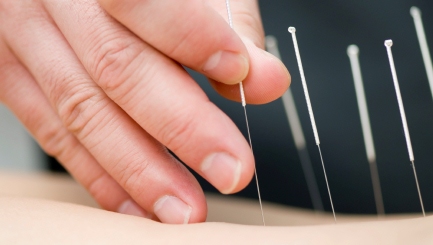Proven: Study Shows Acupuncture Relieves Arthritic Pain
 Whether the effects are physical or all in your head, a study has shown that acupuncture relieves pain from chronic headaches, backaches and arthritis. Though some believe the powers of acupuncture are only that of a placebo effect, wellness experts say that, even so, why not give it a try if it can improve your overall sense of wellbeing and make you feel less pain?
Whether the effects are physical or all in your head, a study has shown that acupuncture relieves pain from chronic headaches, backaches and arthritis. Though some believe the powers of acupuncture are only that of a placebo effect, wellness experts say that, even so, why not give it a try if it can improve your overall sense of wellbeing and make you feel less pain?
For the research, which was published in Archives of Internal Medicine, researchers with the Memorial Sloan-Kettering Cancer Centre in New York and several universities in England and Germany reviewed 29 studies involving almost 18,000 adults. Compared to the usual pain treatment and fake acupuncture, the researchers found that acupuncture works better, and concluded that the results ‘provide the most robust evidence to date that acupuncture is a reasonable referral option.’
Acupuncture seems to be more in vogue than it ever has been, and the American military even use it now to treat pain from war wounds, but what exactly is it? During several, weekly sessions, your acupuncturist will insert long, very thin needles just beneath your skin’s surface at specific points on your body to control pain or stress. Fake acupuncture, on the other hand, is performed on other areas of the body, though it sometimes also uses needles.
However, even though scientists aren’t sure what biological mechanism could explain how acupuncture might relieve pain; the authors of this new study believe that the results point towards more than just a placebo effect. Though acupuncture was better at pain relief than any of its counterparts, the fact that there was a small difference between acupuncture and fake acupuncture indicates acupuncture could have more than a psychological effect, said lead author Andrew Vickers, a cancer researcher at Memorial Sloan-Kettering.
However, according to acupuncture sceptic Dr Stephen Barrett, a retired psychiatrist who runs Quackwatch, a Web site on medical scams, the study results are dubious. Dr Barrett noted that the strict research conditions involved in acupuncture studies don’t reflect how the method is carried out in the real world.
However, Dr Andrew Avins, author of an Archives commentary and a physician and researcher with the University of California at San Francisco and Kaiser-Permanente, argues that the conclusion was more robust because the authors used original data from each study, which most research based on pooling previous studies’ results do not do. ‘Perhaps a more productive strategy at this point would be to provide whatever benefits we can for our patients, while we continue to explore more carefully all mechanisms of healing,’ he added.

Comments are closed.